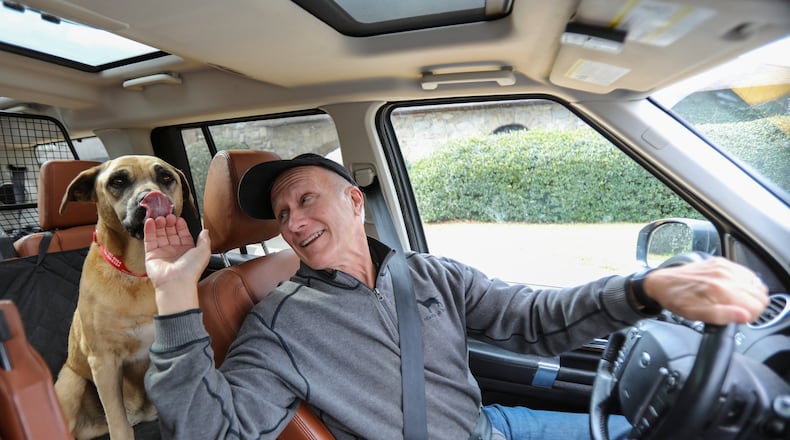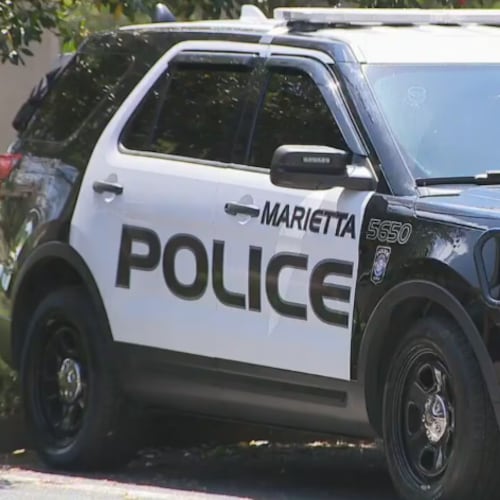Charlie Kleman grabs his tools for the next rescue mission.
Collars and leashes.
Treats to keep his passengers happy and a couple of scoopers for those who have “mistakes” along the way.
Then he hops into his customized 2016 black Range Rover with its metal cages welded into the rear compartment and guns it from the Happy Paws Inn in Mableton down I-75 to Fort Valley.
He knows Georgia’s roads well.
This is his second run to Fort Valley, more than 100 miles south, today and it’s not even noon yet.
Some days, he spends hours on the road, listening to audiobooks to kill the time.
His vehicle carries the unmistakable scent of dog musk from having hauled so many four-legged passengers.
The retired corporate executive is a critical link in Atlanta Lab Rescue's mission.
Since 2015, Kleman, 70, a volunteer, philanthropist and chairman of the rescue’s board, has helped rescue more than 2,000 dogs from around Georgia and surrounding states to give his passengers a second chance.
“It’s so satisfying to think we’re actually making a difference in some dogs’ lives,” said Kleman, the former chief financial officer for the retail chain Chico’s. “When you see how happy a dog’s face is when he knows he’s been rescued, it’s just so great. Wait until you see these two dogs today and how they will change over the course of this two-hour ride.”
RELATED: When you’re gone, what happens to your pets?
Georgia is fifth among states for shelter kills, according to the Best Friends Animal Society, a national animal welfare organization that has a no-kill shelter in Atlanta. In 2018, nearly 42,100 dogs and cats were killed in animal shelters in Georgia.
Kleman keeps a well-thumbed logbook in his SUV. It details each trip. Each life saved.
The Waterloo, New York, native and father of three adult children is active on Facebook and regularly posts photos of his riders. Most are Labs or Lab mixes, but “when the story is right,” he has also helped hounds, German shepherds and pitbulls.
More: Many vets are now doing curbside service
There’s Sahara. Cheyenne. Butch. Oreo and Beethoven.
On a recent Thursday, it was Spudster, a “very frightened owner surrender,” a rescue from Jasper County.
Some are repeat passengers.
Take Clifford, a 90-pound nearly purebred Labrador retriever.
Now, that was a difficult one.
Although Clifford and Kleman got along, the dog was very aggressive and protective of its masters.
Kleman ended up transferring Clifford off and on for two-and-a-half years. From one home to the next to another. He also takes dogs to the kennel and the vet.
“He would actually growl and bite, if you came up too close or too fast to his foster,” said Kleman, who splits his time between his home in Virginia-Highland and a second one in Fort Myers, Florida. “He looked like he was a good dog, just too protective. He found a home late last year and he’s doing great. The owner wanted a dog to protect him because he lives on a farm.”
MORE: Friends to the end
A happy ending. That’s what makes Kleman smile.
Transporters are a critical part of the rescue process.
Some transporters haul dogs all the way up the East Coast. One time, Kleman picked up a blind rescue from a transporter in Florida and drove the dog from South Georgia to north of Atlanta. From there, another volunteer took him north.
Becky Cross co-founded Atlanta Lab Rescue in 2007. That first year, the nonprofit rescued nearly 200 dogs. “You have to bob and weave a lot,” in rescue work, she said.
Labrador retrievers are among the most popular dogs, according to the American Kennel Club.
She said Kleman jumped in with both feet.
“Not just anybody can do transport,” she said. “These dogs are coming from stressful situations and they’re stressed. They’re major flight risks. Charlie has that calming factor. He’s not lost a single dog, and some of them are not that friendly. After a car ride with Charlie, they are his best friend.”
She said many people don’t want to adopt bigger dogs. Vet bills may be higher. It costs more to feed a 60-pound Lab or Lab mix than a 6-pound Chihuahua.
She said the nonprofit accepts donations to supplement costs.
Related: When you're gone, what happens to your pets?
The coronavirus pandemic has also affected their work. The rescue has received a record number of applications for pet adoption.
But Cross said the rescue is not able to do visits in the home with a potential adoptive family and the pet to ensure they are compatible. Instead, they do more of the vetting over the phone and send emails to adoptive owners on how to do the orientation on their own.
There is also a concern that people who adopted as the pandemic progressed will return pets once they resume their normal schedules. What works now, she said, may not work once the shelter-in-place order is totally lifted.
Kleman started his work after he and his wife, Abby, adopted Kandi, a rescue gift from their daughter, Mandi, a cardio-veterinarian, in 1999. Kandi was due to be euthanized. He loved Kandi, who died a few weeks short of her 15th birthday in 2014.
He vowed then that he would help save more dogs like her.
The next year, he started with Atlanta Lab Rescue.
He hasn’t stopped at transportation, though. He made matching contributions on Georgia Giving Day last year to Atlanta Lab Rescue, serves as the bookkeeper and helps fund badly needed kennels.
“Anytime Charlie does something, he puts in 100%,” said Abby Kleman, who is also retired and is a volunteer diver at the Georgia Aquarium. “That’s why he’s so successful. He gets a lot of dogs into homes and into places where they will be loved.”
RELATED: Pet care industry desperate for restart after pandemic
He doesn’t dwell on those he couldn’t save.
He’s learned to read the body language of his riders. He’s snarled at. He’s been bitten three times, once by a dog named Charlie who had been trained as a guard dog.
“And each time, it was my fault,” Kleman said. “I wasn’t as patient as I should have been. We made up and became friends. Almost all rescue dogs are frightened. They don’t know what to expect.”
Some dogs have lived in kennels most of their lives, where the barking of other dogs is like living in surround sound. They can’t sleep at night. They’re afraid to eat.
Some have been mistreated by their owners. Left outside all of their lives and starved. Chained to trees. One dog’s owner had put out cigarette butts on him.
Most are not spayed or neutered.
It angers him “to think that people would do this to an innocent animal. I’ve seen how bad people can be to dogs.”
There was Ziggy, a terrified dog “who had just given up on life.” He wouldn’t take a treat from Kleman.
He rode in the vehicle, curled into a little ball, whimpering. By the time he got to the vet, two hours later, Ziggy had warmed up, and was putting his paws in Kleman’s lap.
“Now he’s in a foster home. The happiest little guy.”
Recently, he picked up Delilah and her son, Pup, from Fort Valley.
He’ll pick them up and take them to a vet where they will be evaluated (the pup has already tested positive for heartworms, which can be deadly), then Happy Paws Inn, the boarding partner for Atlanta Lab Rescue and, hopefully, at some point fostered or adopted into a loving home.
He’s been with mothers and their puppies before. He knows to not suddenly reach for the puppy because it can cause the mother to become protective. He gives Delilah a treat first, then Pup.
A few miles up the road, though, Pup has his first “mistake” and throws up on the floor of the vehicle. Before Kleman can pull off to use his scooper to throw away the vomit, Pup gobbles it up.
Kleman is nonplussed. His seats are covered and he has several mats on the floor.
About 30% of the dogs he transports either poop or vomit during the ride. Many have never been in a vehicle before.
Two times, dogs have busted their stitches, and he’s had to clean up blood. Some have been pregnant, but luckily he hasn’t had to deal with a delivery.
Cross calls Kleman the “patron saint” of the rescue group.
He’s not only changing dogs’ lives.
His work has changed him in some ways.
“I’ve learned how different every dog is,” said Kleman. “I learned how they listen. How they understand. They know they have been rescued. They get to better homes, and that’s what’s important to me.”
About the Author
Keep Reading
The Latest
Featured







